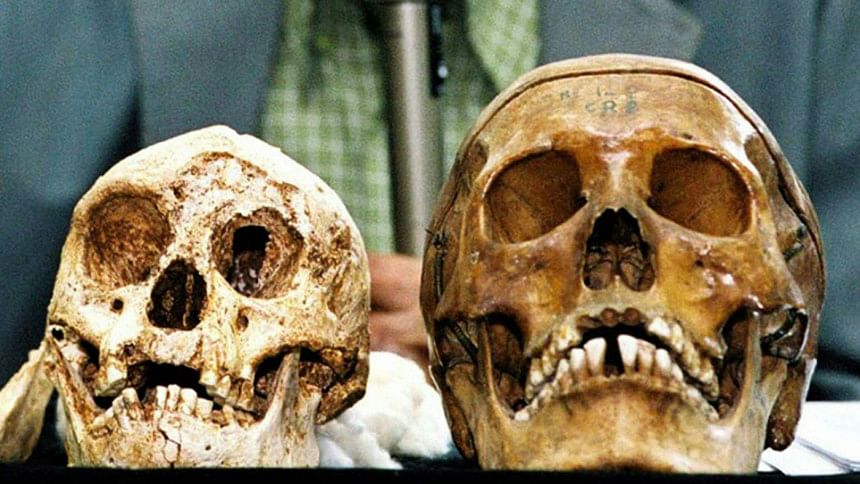Likely ancestor of mystery 'hobbit' found

Half-sized humans who lived 700,000 years ago were almost certainly the ancestors of enigmatic "hobbits" whose fossils were found on the same Indonesian isle in 2003, scientists stunned by their own discovery reported Wednesday.
Two studies, published in Nature, fill a huge gap in our understanding of these diminutive people, whose tortuous evolutionary saga hit a dead-end some 50,000 years ago.
A modest haul of teeth and bones from an adult and two children has bolstered the theory that the hobbits, known to scientists as Homo floresiensis, arrived on Flores island as a different, larger species of hominin, or early man, probably about a million years ago.
And then, something very strange happened.
These upright, tool-wielding humans shrank, generation after generation, until they were barely half their original weight and height.
The process, called "island dwarfism," was well known in animals, with some species shrinking as much as six fold in adapting to an environment with fewer resources.
Indeed, Flores was also home to a miniature race of elephant-like creatures -- possibly hunted to extinction by the mini-men -- called Stegodons.
This is the first hard evidence of humans becoming smaller after being marooned on a spit of land transformed into an island by rising seas.
"The hobbit was real," said Adam Brumm, an archaeologist at the Research Centre of Human Evolution at Griffith University in Queensland, Australia, and lead author of one of the studies.
"It was an ancient human species that is separate to ours and that no longer exists on the planet today."
The new fossils were unearthed in central Flores in 2014, about 100 kilometres (70 miles) from the 2003 discovery of the hobbit remains.
The find provided partial answers to key questions: from which species did H. floresiensis evolve, and how long did it take to shrink?
Two plausible evolutionary scenarios remain regarding their origins, said Brumm.
"The first is that the 'hobbits' represent a kind of dwarfed Homo erectus from Java," he told AFP.
Homo erectus, up to 1.8 metres (six feet) tall and weighing up to 70 kilogrammes (154 pounds), is thought to have been the first human species to venture out of Africa.
A 'huge surprise'
A specimen dated to about 1.2 million years ago -- when much of the Indonesian archipelago was a single land mass -- was found on the island of Java in the late 19th century.
Similarities in the teeth point to this as the most likely parent of the Flores humans, Brumm said.
"The alternative theory is that these creatures descend from an earlier radiation of more archaic, small-boned hominins from Africa."
One theory that can now be set aside, the researchers said, is that Flores' hobbits were actually modern humans diminished by disease or genetic disorders.
"This find quashes once and for all any doubters that believe Homo floresiensis was merely a sick Homo sapiens," said Gert van der Bergh, leader of the excavation and a professor at the University of Wollongong's Centre for Archaeological Science.
Most surprising was that the recently exhumed specimens were no larger than those still living on the island more than 600,000 years later.
"I was stunned when I first saw these new fossils," said co-author Yousuke Kaifu, a scientist at the National Museum of Nature and Science in Tokyo.
Anything that old, he said, had been expected to resemble the bigger Homo erectus, or some other more primitive species.
"What we found was a huge surprise," added Brumm.
"This suggests that H. floresiensis is an extremely ancient species that evolved its small size on Flores at a very early period, possibly soon after it arrived on the island about a million years ago."

 For all latest news, follow The Daily Star's Google News channel.
For all latest news, follow The Daily Star's Google News channel. 








Comments